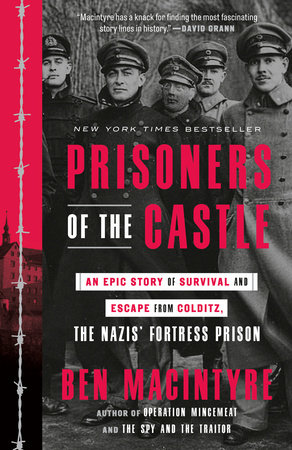Prisoners of the Castle Reader’s Guide
By Ben Macintyre


1. Had you known about Colditz before reading Prisoners of the Castle? What surprised you most about this book? Did the story defy your expectations? Was there anything about World War II that you learned, especially about the lives of POWs? Please explain.
2. Which prisoners resonated with you most, and why? Who was the most courageous, the most obnoxious, the funniest, the most tragic?
3. When you are a prisoner of war, do you have a moral duty to escape? Why or why not? Are there particular circumstances that might affect your answer?
4. Tunneling out. Rappelling down ramparts. Walking through front gate disguised as a German soldier. Which method of escape most impressed you, and why? Which method would you choose, and why?
5. Name three qualities you believe best help someone survive being a POW. Tell us why you chose them.
6. Colditz fortress prison was considered escape-proof. Much like Titanic was considered unsinkable. Now it’s your turn to fill in these blanks: Much like _____ was considered _____.
7. Prisoners of the Castle seamlessly moves between intense drama, daring adventure, a bit of romance, and unexpectedmoments of comedy. How do you think this enriches the reading experience? Which parts did you like most?
8. Were you surprised that class structures and ranks remained intact at Colditz among the prisoners? Why do you think this was the case? Did these categories and hierarchies help or harm POWs, in your opinion?
9. There were many heroes outside Colditz, including a “perfectly ordinary Polish housewife” (to the Nazis) who wasactually an agent of British intelligence; a sawmill worker who became “the most prodigious inventor of escapeequipment in history”; the dental assistant (and lover to a Czech fighter pilot) who, surprisingly, was also a spy; and the Swiss official assigned to make sure Germans complied with Geneva Convention. Which most inspired you, and why?
10. Were you surprised to learn that the German authorities adhered to the Geneva Convention in Colditz? In your view, can “rules of war” have a significant mitigating effect on wartime atrocities, or do you think any effect is purely arbitrary?
11. A man of conviction with an impeccable sense of duty, Birendranath Mazumdar faced a different set of challenges at Colditz and beyond. Despite being a committed Indian nationalist, Mazumdar came to Britain’s defense when war was declared and joined the British Army, proving heroic under fire. How do you explain the way he was treated both during captivity and after he escaped by his own side? Was it just the fact he was a person of color or were there other factors? How do you think he persevered in the face of such adversity?
12. At Colditz: “Reading matter was supplied via the Red Cross, and Penguin Books set up a system whereby . . . individualprisoners received a monthly parcel containing a selection of 10 books.” What would your 10 books be?
13. Did you think that the British prisoners should have gone through with the execution by hanging of traitor Walter Purdy? Why or why not?
14. How did you feel about the fate of Germany’s Lieutenant Reinhold Eggers (supreme security chief of Colditz) at the hands of the Russians?READING GROUP GUIDEPrisoners OF THE CASTLEben macintyre